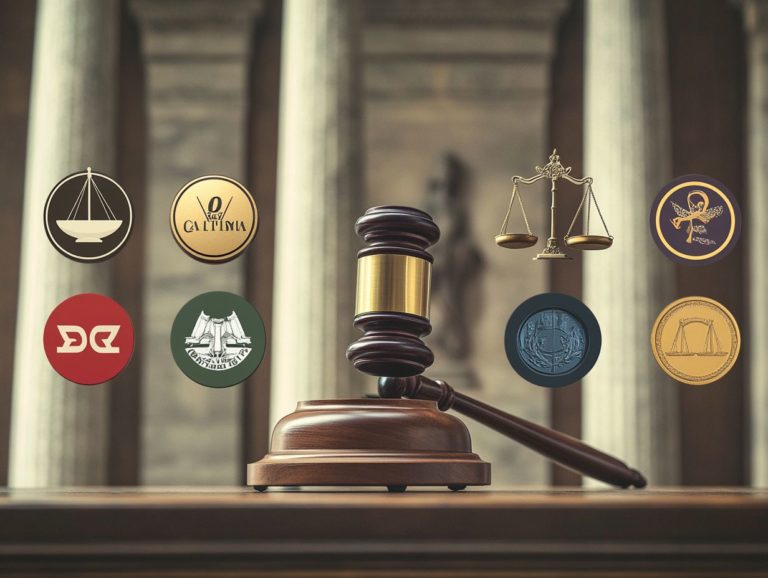5 Must-Know Trademark Facts for Entrepreneurs
Ready to protect your brand? Let’s dive into the world of trademarks!
In today’s competitive landscape, grasping the nuances of trademarks is vital for every entrepreneur. This article distills the essential elements of trademarks, exploring their definition, significance, and the steps involved in securing one.
You will uncover what can be trademarked, the various types available, and the advantages of registration.
The piece also tackles prevalent misconceptions and offers guidance on how to monitor and enforce your trademark rights. Whether you are launching a new venture or seeking to safeguard your brand, these crucial insights will arm you with the knowledge necessary for success.
Contents
- Key Takeaways:
- 1. What Is a Trademark?
- 2. Why Is Trademark Protection Important?
- 3. How Do You Obtain a Trademark?
- 4. What Can Be Trademarked?
- 5. What Are the Different Types of Trademarks?
- 6. How Long Does a Trademark Last?
- 7. What Are the Benefits of Registering a Trademark?
- 8. What Is the Difference Between a Trademark and a Copyright?
- 9. What Are the Consequences of Not Registering a Trademark?
- 10. How Can You Protect Your Trademark?
- 11. What Is the Process for Trademark Infringement?
- 12. Can You Trademark a Domain Name?
- 13. What Are the International Trademark Laws?
- 14. How Can You Monitor and Enforce Your Trademark?
- 15. What Are the Common Misconceptions About Trademarks?
- Frequently Asked Questions
Key Takeaways:

- Trademark protection is crucial for businesses to preserve their brand identity and prevent others from using their marks without permission.
- Entrepreneurs should know that trademarks can be obtained through registration, but also through common law rights by using the mark in commerce. Common law rights mean that you can still have trademark rights just by using the mark in business, even if you haven t registered it.
- Trademark infringement can result in legal consequences, so it is important for entrepreneurs to regularly monitor and enforce their trademark rights.
1. What Is a Trademark?
A trademark is more than just a sign. It s a distinctive mark, symbol, or expression that sets your products or services apart from the competition. It s a fundamental piece of your branding and intellectual property puzzle.
Trademarks can manifest as logos, words, sounds, or colors. They play a pivotal role in shaping your company s identity in the marketplace. Consider how iconic brands like Coca-Cola and Delta Airlines expertly leverage their unique trademarks to forge emotional connections with consumers, reinforcing their place in the market.
Trademarks are not just about building brand loyalty and recognition; they re also essential in the realm of intellectual property law, protecting your company s unique identity. The registration process typically involves submitting an application, showcasing your trademark’s uniqueness, and undergoing a thorough review.
This is where the expertise of trademark professionals becomes invaluable. They guide you through the intricate landscape of trademark law, ensuring your intellectual property is well-protected and maintained. This expertise allows you to identify potential infringements quickly and take the necessary action, underscoring the significance of trademarks in your overall business strategy.
2. Why Is Trademark Protection Important?
Trademark protection is essential for safeguarding your brand assets. By preventing unauthorized use of your trademarks, you can avoid consumer confusion that could jeopardize your reputation and profitability.
In today s competitive marketplace, ensuring that your distinctive brand identifiers remain exclusive to you bolsters consumer trust and enhances your market value. Collaborating with experienced legal professionals can be particularly beneficial, as they provide valuable insights into the intricate world of trademark laws.
By safeguarding your trademark rights, you establish clear brand identification, giving consumers a reliable option while promoting business integrity and loyalty. Building a strong trademark portfolio not only protects your investments but also paves the way for future growth and innovation.
3. How Do You Obtain a Trademark?
Obtaining a trademark involves careful steps you need to follow.
First, conduct a professional trademark search to ensure that your desired trademark is truly unique. This is essential to avoid future conflicts.
Next, you’ll need to prepare and submit a trademark application. This application will then be reviewed by a trademark examiner, a person who checks your application for any issues, at the United States Patent and Trademark Office.
After your initial search, it’s vital for you to carefully craft your application. This includes detailing your mark and its intended use in commerce. You’ll also have to specify the appropriate trademark category, as this can significantly influence registration costs. Different categories come with varying fees, highlighting the importance of understanding the specific goods or services you wish to protect.
Once you submit your application, it will undergo a review process. If approved, it will enter a publication period during which others can oppose your registration, adding yet another layer to the trademark registration journey.
4. What Can Be Trademarked?
You can trademark a variety of elements, including logos, business names, slogans, and specific product categories, as long as they meet the necessary requirements for trademark validity.
This protection is essential for establishing and maintaining a unique business identity in a busy market. A well-crafted logo not only serves as a visual representation of your brand but also enhances recognition and fosters consumer loyalty.
Cleverly worded slogans effectively communicate your brand s values and mission, solidifying its market position.
By securing trademarks for these vital elements, you protect your creative efforts from imitation, ensuring your distinctive brand identity remains intact. This contributes to your long-term success and builds customer trust.
5. What Are the Different Types of Trademarks?

Trademarks come in several distinct categories: word marks, design marks, service marks, and trade names. Each plays a unique role in brand identification and protection.
Word marks safeguard your brand names or slogans, while design marks protect logos and visual symbols. A service mark is similar to a trademark but is specifically for services, ensuring you can defend your unique offerings in competitive markets. Trade names refer to the legal name under which your business operates.
Understanding how these types align with various trademark classes like Class 25 for clothing or Class 35 for advertising services is crucial for effective registration and enforcement of your trademark rights. This knowledge helps you navigate the complexities of brand protection confidently.
6. How Long Does a Trademark Last?
A trademark can last forever if you use it wisely and maintain it through proper renewal processes, which ensure your trademark rights remain intact.
The duration of trademark protection is vital for your business, allowing you to cultivate brand identity and build consumer trust over time. This protection requires regular effort to maintain, typically involving renewals every ten years.
This renewal isn t just a formality; it requires demonstrating that the trademark is still in active use and hasn t become generic.
If you fail to maintain your trademark, you risk losing exclusive rights, which could let competitors adopt similar branding. This confusion dilutes your brand s value.
7. What Are the Benefits of Registering a Trademark?
Registering a trademark offers numerous advantages, such as enhanced protection, exclusive rights to use your mark in commerce, and a legal presumption of ownership. These elements work together to solidify your business identity and brand assets.
With a registered trademark, you can pursue legal action against any potential infringement, safeguarding your unique offerings. This legal protection discourages unauthorized use and fosters consumer trust.
You can also license your trademarks to third parties, opening up new revenue streams while maintaining control over your brand s integrity. Ultimately, trademark registration is crucial for elevating your brand identity, facilitating growth, and ensuring long-term success.
Take the next step in protecting your brand today by considering trademark registration!
8. What Is the Difference Between a Trademark and a Copyright?
While both trademarks and copyrights fall under the broad umbrella of legal protections for creations, they serve distinct purposes. Trademarks protect brand identifiers think logos and business names. In contrast, copyrights safeguard original works of authorship, such as literature, music, and art.
Consider a coffee shop: its logo and name are shielded by trademark laws, ensuring consumers can easily identify the brand. This avoids confusion with other establishments. When a musician pens a song, copyright laws automatically protect that creation, giving the artist control over how the music is used and distributed.
Understanding these distinctions is vital for both businesses and creators. Grasping the nuances can profoundly impact your marketing strategies and revenue streams. It allows you to ensure that your innovations and brand identities are effectively protected against infringement and misuse.
9. What Are the Consequences of Not Registering a Trademark?
Failing to register a trademark can result in serious consequences, including the loss of exclusive rights to your trademark. You also face an increased risk of infringement and difficulties in enforcing brand protection under common law.
Without formal registration, your business risks becoming vulnerable to trademark disputes, especially if a competitor uses a name or logo that closely resembles yours. This complicates efforts to protect your brand and highlights the importance of trademark education for businesses, which can lead to expensive legal battles or, worse, the complete abandonment of your brand.
There have been instances where companies had to rebrand entirely after losing a dispute due to their lack of registration. Therefore, taking proactive steps for brand protection through trademark registration is essential. It s your key to establishing strong ownership and legitimacy, ultimately giving you the power to defend your intellectual property more effectively.
10. How Can You Protect Your Trademark?

Protecting your trademark requires a comprehensive strategy. This encompasses vigilant monitoring for potential infringements, diligent enforcement of your trademark rights, and seeking legal counsel whenever necessary to uphold your brand’s identity.
You should regularly conduct trademark searches to identify any similar marks that could confuse consumers. This can be achieved through online databases and trademark registries, ensuring that no unauthorized entities misuse similar branding.
Consistent monitoring for unauthorized use across social media platforms, websites, and marketplaces is crucial. This allows you to act swiftly against any infringements.
Engaging a qualified trademark attorney can significantly streamline this process. They provide expert advice on trademark registration and assist in enforcement procedures, helping you navigate the complex legal landscape while you focus on your growth and branding efforts.
11. What Is the Process for Trademark Infringement?
The journey to address trademark infringement begins with identifying the infringement itself. This is followed by carefully keeping records of evidence and potentially engaging in legal action to enforce your trademark rights often culminating in proceedings in federal court.
To navigate these situations effectively, you must first gather comprehensive evidence, including brand usage, marketing materials, and customer feedback that highlights the impact of the infringement.
After compiling this information, consulting an attorney who specializes in intellectual property is crucial to assess the strength of your case.
The subsequent steps may involve sending a cease-and-desist letter to the infringing party. This letter can often resolve the issue without further escalation. If negotiations don’t yield results, filing a lawsuit may be necessary.
Ultimately, protecting your trademark is vital not just for maintaining brand integrity but also for upholding consumer trust. To better understand this, it’s helpful to explore common myths about trademarks debunked. Each of these steps is critical for safeguarding your business interests.
12. Can You Trademark a Domain Name?
You can trademark a domain name. It must meet criteria like being distinctive and actively used in commerce. This step can significantly enhance your online branding efforts.
The process requires you to demonstrate that your name isn t just unique but also serves as a clear identifier for the goods or services you offer.
For online businesses, securing a trademark comes with substantial benefits, including legal protection against potential infringements and a competitive edge in the marketplace.
Remember, while registering a domain name is easy, it doesn’t give you the full protection you need! This only grants you technical ownership and doesn’t ensure exclusive rights to the name itself. Trademark registration, on the other hand, establishes a legal framework that protects against unauthorized use and helps you cultivate stronger brand recognition.
Take charge of your brand’s future consult a trademark expert today!
13. What Are the International Trademark Laws?
International trademark laws differ considerably from one jurisdiction to another. Treaties like the Madrid Protocol make it easier for you to register and protect trademarks across multiple countries, including the United States and Canada.
These international frameworks allow you to streamline your registration processes, significantly reducing the complexity of safeguarding your business ideas and brands on a global scale.
Challenges exist when navigating the intricacies of various legal systems. The diversity in trademark laws and enforcement regimes can create confusion and lead to potential disputes.
It s essential for you to stay informed and adaptable as you expand into new markets. Grasping local trademark practices and recognizing potential pitfalls becomes a crucial part of your overall strategy.
This knowledge ensures your brand remains protected worldwide, allowing you to focus on growth with confidence.
14. How Can You Monitor and Enforce Your Trademark?
Monitoring and enforcing your trademark requires ongoing vigilance. This includes conducting regular trademark searches and keeping an eye out for potential infringements.
Taking legal action when necessary is vital to prevent consumer confusion and protect your brand identity. Effective monitoring strategies might involve setting up alerts for similar trademarks or utilizing software designed to track potential infringements across various platforms.
It s also wise to tap into the expertise of trademark professionals. They can provide invaluable guidance in navigating the complexities of trademark law.
Legal consultation is essential, not just for crafting a robust enforcement plan but also for ensuring compliance with regulatory requirements.
By proactively leveraging these resources, you can safeguard your trademark rights, fortify your reputation, and maintain a competitive edge in the marketplace.
15. What Are the Common Misconceptions About Trademarks?

Common misconceptions about trademarks can lead you to misunderstand your trademark rights. For instance, you might think that registering a trademark is unnecessary, but following the proper steps to a successful trademark application is crucial, as not all business names are automatically protected.
These inaccuracies can significantly affect your branding strategies, leaving you to operate under the mistaken belief that your identity is safe without formal registration.
By neglecting the proper procedures, you could inadvertently expose yourself to infringement issues or brand dilution, jeopardizing your competitive edge.
Misunderstandings like these can cause you to overlook the nuances of trademark law, including the vital importance of conducting thorough searches for existing marks.
Understanding the realities of trademark registration is essential for establishing a strong business identity that effectively navigates the marketplace. Conducting a trademark search early can help you avoid potential legal issues, as outlined in 5 reasons to conduct a trademark search early.
Frequently Asked Questions
What is a trademark, and why is it important for entrepreneurs?
A trademark is a unique symbol, word, or phrase that represents a business or its products or services. It distinguishes a business from its competitors and helps consumers identify the source of the goods or services.
For entrepreneurs, a trademark is important as it helps build brand recognition and strengthen their trademark, protecting their business from infringement.
Do I need to register my trademark?
Registering a trademark is not mandatory, but it is highly beneficial for entrepreneurs. It grants exclusive rights and legal protection against infringement, and there are important factors to consider, like the 5 things to consider when licensing your brand.
It also proves ownership and can help in legal disputes.
What is the difference between a trademark and a copyright?
A trademark protects a word, phrase, symbol, or design that identifies a business or its products. Copyright protects original works like books, music, or art.
In short, trademarks are about business identity, while copyrights are about creative works.
Can I trademark my business name?
Yes, you can trademark your business name if it s unique. Ensure it doesn t closely resemble existing trademarks in your industry.
Avoid generic or overly descriptive names, as they can complicate the trademarking process.
How long does a trademark last?
A trademark can last indefinitely if used in commerce and required paperwork is submitted. In the U.S., trademarks must be renewed every 10 years to stay valid.
What should I do if my trademark is infringed upon?
If you suspect trademark infringement, gather evidence first. Then, consult a trademark attorney for guidance on your options.
Taking prompt action is crucial to protect your trademark and brand identity.






